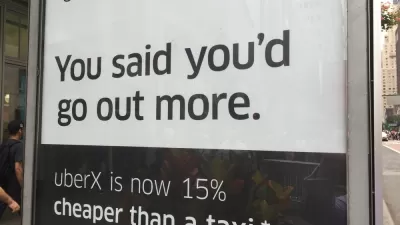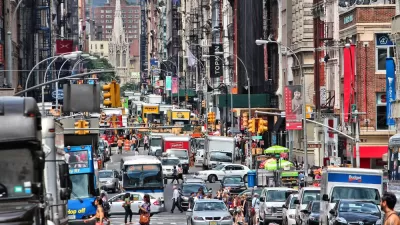New research from researchers at Carnegie Mellon University finds that instead of setting people free from cars, more people are buying and using cars than ever before.

Kea Wilson shares news of research about the effect of ride-hailing companies in U.S. transportation trends.
"In a review of vehicle registration records in more than 200 metro areas, researchers at Carnegie Mellon University found that per-capita car purchases increased 0.7 precent on average in the years after Uber, Lyft and other e-taxi giants deployed their fleets, compared to projected registration rates prior to the entry to of the companies," writes Wilson to summarize the findings of the new research.
What's more, car-dependent locations saw larger increases of vehicle registrations. "Metros that had higher-than-average rates of private vehicle ownership to start out experienced, on average, an additional 1 percent increase in vehicle registration over the course of the study period when compared to peer cities," adds Wilson.
Wilson's conclusion, based on these findings, is that ride-hailing companies have been less effective at reducing car dependence than some in the industry hoped.
The new research also suggests that ride-hailing trips have replaced transit rides, echoing to research first published by Planetizen in 2017.
FULL STORY: Study: E-Taxis Increase Private Car Ownership in Many Cities

Trump Administration Could Effectively End Housing Voucher Program
Federal officials are eyeing major cuts to the Section 8 program that helps millions of low-income households pay rent.

Planetizen Federal Action Tracker
A weekly monitor of how Trump’s orders and actions are impacting planners and planning in America.

The 120 Year Old Tiny Home Villages That Sheltered San Francisco’s Earthquake Refugees
More than a century ago, San Francisco mobilized to house thousands of residents displaced by the 1906 earthquake. Could their strategy offer a model for the present?

HSR Reaches Key Settlement in Northern California City
The state’s high-speed rail authority reached an agreement with Millbrae, a key city on the train’s proposed route to San Francisco.

Washington State Legislature Passes Parking Reform Bill
A bill that would limit parking requirements for new developments is headed to the governor’s desk.

Missouri Law Would Ban Protections for Housing Voucher Users
A state law seeks to overturn source-of-income discrimination bans passed by several Missouri cities.
Urban Design for Planners 1: Software Tools
This six-course series explores essential urban design concepts using open source software and equips planners with the tools they need to participate fully in the urban design process.
Planning for Universal Design
Learn the tools for implementing Universal Design in planning regulations.
Ada County Highway District
Clanton & Associates, Inc.
Jessamine County Fiscal Court
Institute for Housing and Urban Development Studies (IHS)
City of Grandview
Harvard GSD Executive Education
Toledo-Lucas County Plan Commissions
Salt Lake City
NYU Wagner Graduate School of Public Service





























